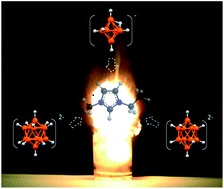A research team from the Institute of Process Engineering (IPE), Chinese Academey of Sciences (CAS) has just developed a series of borohydride cluster-based hypergolic ionic liquids (HILs), overcoming the lack in the hydrothermal stability and showing superior ignition performance in comparation with other HILs based on traditional borohydride groups.
Led by Prof. ZHANG Suojiang, Member of CAS, and ZHANG Yanqiang, a professor of IPECAS, the researchers synthesized three new families of hypergolic ionic liquids based on borohydride cluster anions ([B12H12]2-, [B10H10]2- and [B6H7]-) with imidazolium cations, which show high hypergolic activities (ignition delay time as short as 1 ms) upon contact with HNO3 or N2O4, and good hydrothermal stability (Td > 200 °С), distinguishing from many of the reported borohydride HILs. In addition, borohydride cluster-based hypergolic fuels exhibit a wide range of oxidizer/fuel combinations resulting in high performance, which is advantageous for fast response, attitude control systems in rockets. Therefore, borohydride cluster-based ILs have great potential as green fuels with high stability and performance in bipropulsion systems.

High-speed camera photo of the ignition for a droplet of borohydride cluster based hypergolic ionic liquid falling into 100% HNO3 (Image by ZHANG et al.)
“The studies of HILs as rocket fuels have developed rapidly since the unique properties of ionic liquids can aid in compensating for the difficulties associated with hydrazine-based fuels. The traditional borohydride-rich HILs show good ignition performance with WFNA. However, most of them exhibit poor thermal stability when highly-reactive borohydride anions (e.g., [BH4]-, [BH3CN]- and Al[BH4]4-) are used, which essentially precludes their practical application.” said ZHANG. "Therefore, the search for new borohydride anions featuring good stability, ultrafast ignition delay time and high specific impulse remains a very challenging task."
The team conducted a series of experiments and theory calculations to elaborate the advantages of new hypergolic fuels, such as excellent hypergolic activities, high hydrothermal stabilities, high heats of formation and specific impulses, which show the potential application in hypergolic propellant systems.
This research was supported by the the National Key Research and Development Program of China (2016YFB0600903), the National Natural Science Foundation of China (21376252, 21576270 and 21676281) and the Key Laboratory of Green Process and Engineering, CAS.
Their work entitled “Hypergolic fuels based on water-stable borohydride cluster anions with ultralow ignition delay times” has been published in J. Mater. Chem. A, 2017,5, 13341-13346 (DOI: 10.1039/C7TA04038E).
For more information, please refer to the journal website: http://pubs.rsc.org/en/Content/ArticleLanding/2017/TA/C7TA04038E#!divAbstract
Media Contact:
YUAN Pei
International Cooperation Office, Institute of Process Engineering, Chinese Academy of Sciences, Beijing 100190, P. R. China.
E-mail: pyuan@ipe.ac.cn
Tel:86-10-82544882